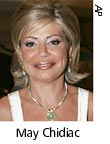New York, September 26, 2005—The Committee to Protect Journalists voiced outrage today at the attempted murder of Lebanese news anchor May Chidiac, a strong critic of Syria. Chidiac, a political talk show host with the Lebanese Broadcasting Corporation, was seriously wounded when a bomb exploded in her car near the port city of Jounieh on Sunday evening.
She is the third journalist who has criticized Syrian influence in Lebanon to be attacked since the February 2005 assassination of former Prime Minister Rafik Hariri. The Hariri killing led to anti-Syrian protests, which prompted Damascus in April to withdraw its troops from Lebanon after 29 years. The attacks against the journalists were similar in nature; in each case, a bomb was placed under the driver’s seat of the journalist’s vehicle.
“We condemn this appalling attack on a journalist and the alarming climate of fear that it creates in Lebanon,” CPJ Executive Director Ann Cooper said. “Unless the perpetrators are brought to justice immediately, it will undermine press freedom and encourage further attacks.”
On the morning of the attack Chidiac had hosted a show addressing Syria’s possible involvement in Hariri’s assassination and public fears of violence ahead of a report by U.N. investigators into the killing.
Chidiac suffered serious injuries to her face, left arm, and left leg. She was reported in critical condition today in the intensive care unit of Hotel Dieu de France in Achrafieh.
Ten days ago, Ali Ramez Tohme, a journalist who had just published a book about Hariri, escaped a similar assassination attempt. A bomb exploded under the driver’s seat of his car, but he was not in the vehicle. The Daily Star, citing an explosives expert, said 200 grams of dynamite were used.
Tohme found a statement threatening to kill him outside his parent’s house in Mazboud from the “Jund Ash-Sham,” a previously unknown terrorist group that claimed responsibility for Hariri’s murder, The Daily Star reported.
On June 2, 2005, columnist Samir Qassir was killed in a car bombing outside his home in Beirut. In his popular column for Al-Nahar newspaper, Qassir was a vigorous critic of Syria and its Lebanese allies. He was frequently threatened and harassed for his outspoken writing.
